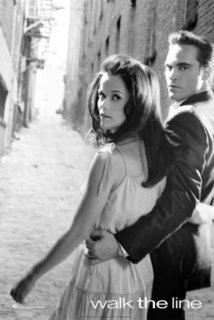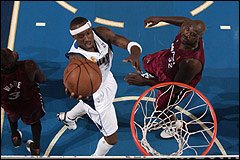
Last night I saw the movie that documents a portion of Johnny Cash’s life, Walk the Line. Everything I know about Johnny Cash I learned in this movie, so I cannot vouch for its historical accuracy. However, this is the best movie I’ve seen in the past year. No scene, no line, no song was wasted or overdone. The music fit tightly into the movie’s storyline so you didn’t have to be a fan to appreciate the scenes that were powered by Johnny Cash’s (and June Carter’s) music. I am left curious about Cash’s faith, and will have to do some research on that. But overall, a great film.
My favorite scene is when Johnny Cash and his two backup men are auditioning for a recording contract. The executive isn’t impressed with the gospel song they are singing. The following exchange occurs between Cash and the exec:
“Gospel like that doesn’t sell.”
“Is it the Gospel or what I sing?”“Both.”
“What’s wrong with the way I sing?”
“I don’t believe you.”
“You don’t believe in God?”
The point is that Cash (at least at this point in his life) can’t sing the gospel convincingly. The executive urges him to sing something that he can sing from the heart.
Cash says:
“I got a couple songs I wrote in the airforce. You got anything against the airforce?”
“No.”
“I do.”
And with a soft snarl of defiance, of bottled anguish being cautiously freed, the music really begins…
A sort of conversion is hinted at later in the movie, when Cash receives a “second chance” from God and heads into a church with June Carter. One of the deleted scenes offered on the DVD shows the sermon Cash hears when he is in the church. It is not so much the gospel message as a description of Cain and Abel, and we are led to believe that Johnny Cash is finding that he can relate to the wayward characters of Scripture. He next heads to Folsom prison to benefit the inmates and record his greatest record.
It is interesting that the writer/director said he deleted the sermon scene because he couldn’t convincingly portray the powerful way in which June Carter brought God into Cash’s life. Thus, the director practiced what he preached in this movie: Those who present the gospel (in song, in film) must do so convincingly. Better to not do it at all than to do it unconvincingly!
It’s tough to be both deeply devout and deeply honest. The best Christian artists do both. The best preachers do both. The best Christians do both. It’s our high and holy calling to interact with the great mysteries of the faith with honesty and humility. Though we are forever pulled toward hypocrisy by inside pressure (pride) and outside pressure as well, we must resist this just as we resist every other sin.













